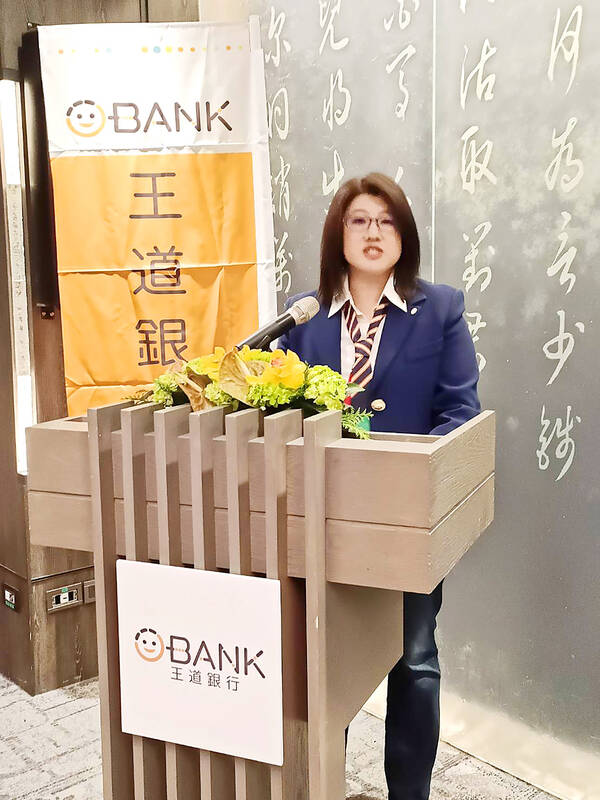O-Bank Co Ltd (王道商業銀行), the nation’s first online bank, is pursuing double-digit percentage growth in core businesses this year on top of last year’s record earnings, undeterred by lingering economic uncertainty, top-ranking officials said yesterday.
O-Bank is optimistic about fee and interest income growth, as well as wealth management and foreign-exchange gains, driven by a strategy focusing on lending with affiliates of major Taiwanese corporations, bank president Elton Lee (李芳遠) said.
Conducting business with corporate clients generates higher margin despite a lack of financial protection from their parent companies, Lee said.

Photo: Lee Chin-hui, Taipei Times
O-Bank considers risk controls essential, as evidenced by its improving return on equity to 13.59 percent and return on assets to 1.5 percent last year, he said.
The “bad loan” ratio stood at a low 0.35 percent, and non-performing loan coverage ratios reached 431.51 percent, affirming healthy asset quality, Lee said.
Pre-tax profit in the first two months of this year totaled NT$950 million (US$30.99 million), rising 10.6 percent from the same period last year and ahead of expectations, Lee said.
The figures showed earnings per share rising 18.75 percent year-on-year to NT$0.19, indicating that the bank “stayed on the right track” and grew more profitable three years after new leadership, said O-Bank chairwoman Tina Lo (駱怡君), who assumed her position in 2020.
The lender last year achieved record profit of NT$5.8 billion, supported by improving commercial and retail banking, along with a merger of its IBT International Leasing Corp (台駿租賃) with Jih Sun International Leasing & Finance Co (日盛台駿租賃), Lo said.
O-Bank has a 44.5 percent stake in Jih Sun and would distribute profit proportionately, she said.
When not including the merger benefit, net income at O-Bank last year would have increased 9 percent to NT$2 billion, better than transforming to a commercial bank, Lo said.
The bank aims to add more than 100 employees to its payroll this year to meet expansion needs at its corporate and retail banking businesses, she said.
O-Bank plans to distribute cash dividend this year similar to last year's level at NT$0.3 per share but the board has not reached a decision on the matter yet, Lo said. Like most other peers, O-Bank lost NT$2.8 billion last year due to the global financial tumult.
Additionally, the online banking environment this year appears to be challenging, as stakeholders must increase their economic scale before seeking profit, Lee said.
Taiwan’s central bank is likely to slow or halt monetary tightening next week to allow economic growth, Lee said.
Other policy tools to fight inflation exist, and rate hikes should be the last resort, he added.

When an apartment comes up for rent in Germany’s big cities, hundreds of prospective tenants often queue down the street to view it, but the acute shortage of affordable housing is getting scant attention ahead of today’s snap general election. “Housing is one of the main problems for people, but nobody talks about it, nobody takes it seriously,” said Andreas Ibel, president of Build Europe, an association representing housing developers. Migration and the sluggish economy top the list of voters’ concerns, but analysts say housing policy fails to break through as returns on investment take time to register, making the

EARLY TALKS: Measures under consideration include convincing allies to match US curbs, further restricting exports of AI chips or GPUs, and blocking Chinese investments US President Donald Trump’s administration is sketching out tougher versions of US semiconductor curbs and pressuring key allies to escalate their restrictions on China’s chip industry, an early indication the new US president plans to expand efforts that began under former US president Joe Biden to limit Beijing’s technological prowess. Trump officials recently met with their Japanese and Dutch counterparts about restricting Tokyo Electron Ltd and ASML Holding NV engineers from maintaining semiconductor gear in China, people familiar with the matter said. The aim, which was also a priority for Biden, is to see key allies match China curbs the US

NOT TO WORRY: Some people are concerned funds might continue moving out of the country, but the central bank said financial account outflows are not unusual in Taiwan Taiwan’s outbound investments hit a new high last year due to investments made by contract chipmaker Taiwan Semiconductor Manufacturing Co (TSMC, 台積電) and other major manufacturers to boost global expansion, the central bank said on Thursday. The net increase in outbound investments last year reached a record US$21.05 billion, while the net increase in outbound investments by Taiwanese residents reached a record US$31.98 billion, central bank data showed. Chen Fei-wen (陳斐紋), deputy director of the central bank’s Department of Economic Research, said the increase was largely due to TSMC’s efforts to expand production in the US and Japan. Investments by Vanguard International

STRUGGLING TO SURVIVE: The group is proposing a consortium of investors, with Tesla as the largest backer, and possibly a minority investment by Hon Hai Precision Nissan Motor Co shares jumped after the Financial Times reported that a high-level Japanese group has drawn up plans to seek investment from Elon Musk’s Tesla Inc to aid the struggling automaker. The group believes the electric vehicle (EV) maker is interested in acquiring Nissan’s plants in the US, the newspaper reported, citing people it did not identify. The proposal envisions a consortium of investors, with Tesla as the largest backer, but also includes the possibility of a minority investment by Hon Hai Precision Industry Co (鴻海精密) to prevent a full takeover by the Apple supplier, the report said. The group is